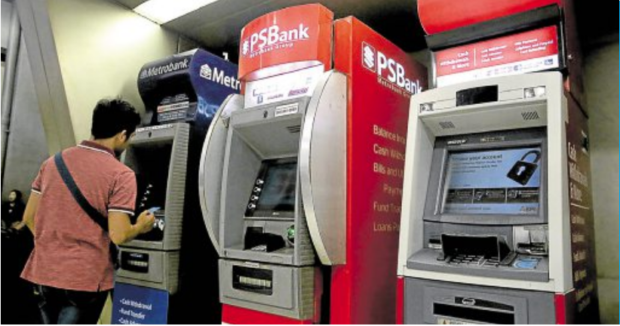Watch out for digital vote-buying, AMLC tells banks

ALERT | A man withdraws cash from an automated teller machine in a mall in Manila in this 2019 photo. The Anti-Money Laundering Council has asked banks to watch out for signs of digital or electronic vote-buying in the run-up to the May elections. (Photo by RICHARD A REYES / Philippine Daily Inquirer)
MANILA, Philippines — The Anti-Money Laundering Council (AMLC) directed banks and other financial institutions on Monday to be on the lookout for dirty cash that might be spent on digital vote-buying and vote-selling.
The AMLC issued the advisory less than three months before election day on May 9. With campaigning for national posts in full swing, the AMLC is anticipating an increase in online transactions and payments related to the national elections,
Section 261 of Article 22 of the Omnibus Election Code of the Philippines lists vote-buying and vote-selling as prohibited acts and election offenses.
The AMLC said that all covered entities under the Anti-Money Laundering Act of 2001 should “conduct appropriate customer due diligence measures, including ongoing monitoring, electronic or otherwise, of their customers’ transactions; and to file suspicious transaction reports, if warranted under the circumstances” amid an anticipated influx in financial activities during the election season.
Doing so would also “ensure that proceeds from unlawful activities are not laundered during the campaign period,” the AMLC said.
It listed what banks and other financial entities should consider as “red flags” or suspicious behaviors that may lead to illegal activities such as vote- buying and vote-selling.
These include significant or large transactions occurring in a short period of time, unjustified large cash deposits and withdrawals and “transactions [that] seem to be inconsistent with the customer’s financial profile or declared business.”
The AMLC likewise encouraged financial institutions to be on the lookout for “unusual transactions or activities compared with normal everyday trade or dealings.”
The other red flags identified by the AMLC that may be linked to digital vote-buying include structured cash deposits and money transfers; use of multiple accounts by a single transactor, as well as the use of several money service businesses to send funds.
Heightened risks
Social media and online chat groups have been abuzz about some politicians who supposedly sent funds to their bank or digital payment accounts such as GCash or PayMaya in exchange for their votes. But many turned out to be “fake” news when netizens verified these claims.
Vote-buying happens when “any person who gives, offers or promises money or anything of value, gives or promises any office or employment, franchise or grant, public or private, or makes or offers to make an expenditure, directly or indirectly, or cause an expenditure to be made to any person, association, corporation, entity, or community in order to induce anyone or the public in general to vote for or against any candidate or withhold his vote in the election.”
In January, the Bangko Sentral ng Pilipinas (BSP), which is part of the interagency AMLC, reminded banks to strengthen measures against electronic vote-buying and vote-selling.
The law also lists conspiring to bribe voters, or when two or more persons, whether candidates or not, come to an agreement concerning the commission of any violation of vote-buying and vote-selling and deciding to commit it, as an election offense.
The BSP issued a memorandum aimed at mitigating the heightened risks brought about by the use of electronic channels, including mobile wallets and online banking, for illegal campaign and election activities.
The BSP flagged potential unlawful activities as those where there is a concentration or a significant number of transaction account registrations, particularly in areas where vote-buying or vote-selling has been identified as rampant.
The BSP said it was not only working closely with the Commission on Elections and the Philippine National Police but has also alerted banks to be vigilant of huge cash transactions during the election season.
Banks have also been told to be wary of suspicious fund flows between accounts, as well as unusual volume and value of transactions in cash-in or cash-out channels.
Banks and other BSP-supervised financial institutions were advised to adjust their fraud management systems and transaction monitoring to foil the possible misuse of online financial channels.
As of end-2020, one in five financial transactions was made through digital payments, including e-wallets. The BSP has projected an even bigger share of digital payments to total financial transactions last year.
RELATED STORY
BSP to banks, firms: Stop digital vote buying, selling














